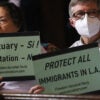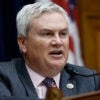Recent developments in Congress now make clear that Congressional leadership is willing to go through all of 2010 without a death tax in order to get what they have wanted all along – a death tax with a rate and exemption amount at their levels prior to the 2001 and 2003 tax cuts.
According to an article in today’s Tax Notes (subscription required):
Senate Finance Committee ranking minority member Chuck Grassley, R-Iowa, blamed Senate Majority Leader Harry Reid, D-Nev., on June 2 for the uncertainty about the future of the estate tax…Grassley said in a conference call with reporters that “Reid will not really give a clear direction” about his position on the estate tax… “The Finance Committee would like to take up consideration of [Kyl’s] legislation, but we aren’t assured by the majority leader that the bill passed out of committee would be taken up on the floor,” Grassley said.
Such delaying tactics are no accident and are likely part of a larger strategy by Congressional leadership to put off any action on the death tax this year.
The death tax has been dormant since the beginning of 2010. A one year expiration of the death tax in 2010 was the culmination of a Congressional policy of phasing down the rate, raising the portion of estates exempt from taxation, and ultimately repealing the tax that began in 2001. Unfortunately for taxpayers, because of budgetary quirks the death tax comes back to life at its rate and exemption level prior to 2001 (55 percent with a $1 million exemption).
All year long Congress has haggled over what to do about the death tax. In December 2009 the House of Representatives passed a bill that would have permanently extended the death tax at a 45 percent rate with a $3.5 million exemption. The Senate failed to act on that bill and still has not done anything in regard to the death tax. This has left countless families that have lost loved ones this year in the lurch as they await Congressional action to find out how much death tax they owe. And it has made planning almost impossible for other families anticipating the loss of a family member in future years.
While Congressional inaction on the death tax is infuriating for families and estate tax planners, doing nothing this year has likely been the plan of Congressional leadership all along. If Congress does nothing, the rate kicks back up to the exorbitantly high 55 percent rate and relatively low $1 million exemption level on January 1, 2011. Even though they have to accept no death tax this year, Congressional leadership is willing to swallow what is a bitter pill for them to get back to a death tax that impacts many more families and hits them with a punitively high rate. And to get what they want all they have to do is continue to drag their heels as Majority Leader Reid is doing in the Senate.
The death tax is a serious drag on the economy and ultimately hits family-owned businesses hardest. Repealing it would create 1.5 million jobs. It is long past time for Congressional leadership to stop playing games and get to work repealing this harmful tax.
?































